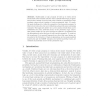Free Online Productivity Tools
i2Speak
i2Symbol
i2OCR
iTex2Img
iWeb2Print
iWeb2Shot
i2Type
iPdf2Split
iPdf2Merge
i2Bopomofo
i2Arabic
i2Style
i2Image
i2PDF
iLatex2Rtf
Sci2ools
115
click to vote
JELIA
2010
Springer
2010
Springer
Parametrized Logic Programming
Traditionally, a logic program is built up to reason about atomic first-order formulas. The key idea of parametrized logic programming is that, instead of atomic first-order formulas, a parametrized logic program reasons about formulas of a given parameter logic. Of course, the main challenge is to define the semantics of such general programs. In this work we introduce the novel definitions along with some motivating examples. This approach allows us to prove general results that can be instantiated for every particular choice of the parameter logic. Important general results we can prove include the existence of semantics and the alternating fix-point theorem of well-founded semantics. To reenforce the soundness of our general framework we show that some known approaches in the literature of logic programming, such as paraconsistent answer-sets and the MKNF semantics for hybrid knowledge bases, are obtained as particular choices of the parameter logic.
Related Content
| Added | 28 Jan 2011 |
| Updated | 28 Jan 2011 |
| Type | Journal |
| Year | 2010 |
| Where | JELIA |
| Authors | Ricardo Gonçalves, José Júlio Alferes |
Comments (0)

